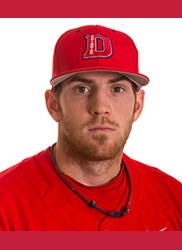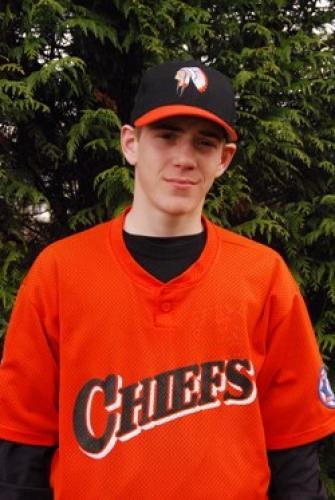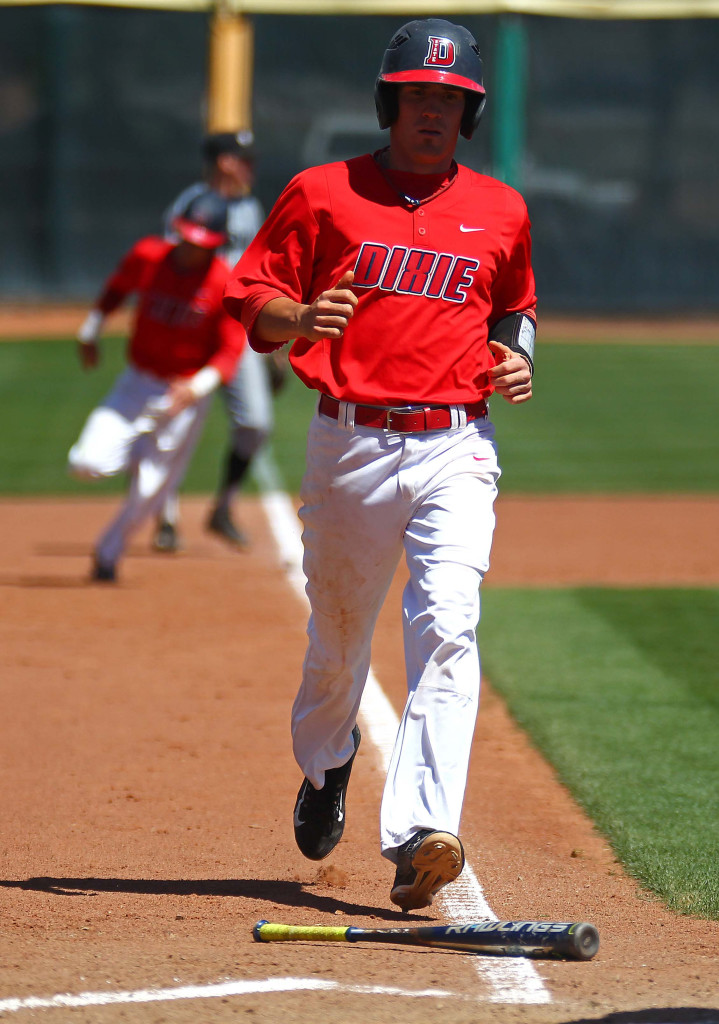
“One of the beautiful things about baseball is that every once in a while you come into a situation where you want to, and where you have to, reach down and prove something.”— Nolan Ryan
ST. GEORGE — Too small. That was the overwhelming characteristic that recruiters used to describe Dixie State shortstop Tanner Morache when he was looking for a place to land to play the game he loves.

“I was not very big, that was strike one,” said Morache. “Strike two was that I was from Canada. Not too many baseball players come from Canada.”
Though hockey is the sport of passion in the Great White North, Morache is the son of a baseball coach. “My dad coached my team in little league,” said Tanner. “And my brother, Miller, was also a big influence early for me.”
Miller Morache is three years older. The two rarely played on the same team, but competed against each other from an early age. When Tanner was only five-years-old, he was in the backyard batting against his brother. Miller struck him out. Tanner became so angry that he threw his bat at his older brother and broke his nose.
“I was probably gloating,” said Miller. “But he is so competitive that he threw his bat at me. Then he cried with me when he found out he broke my nose.”
“Baseball is 90 percent mental and the other half is physical.”—Yogi Berra

More than any other athletes, baseball players are known for their superstitious behavior and Tanner Morache is no exception. “He got the nickname “Stinky” when he was younger,” said his father, Glenn Morache. “Each of the boys had two pairs of pants. They were supposed to turn them in after every game to be washed and wear the other pair for the next game. But Tanner had a pair he loved, so he continually turned in his clean pair to be washed and would show up to the next game with dirty, stained, smelly pants. It took us awhile to figure out what was going on.”
That stubbornness and competitive edge kept Tanner working to overcome his diminutive stature. “He has always done well defensively and on the bases,” said his father Glenn. “Where his size hurt him was at the plate. He has put in many hours working on that part of his game.”
Despite growing up in the Canada, Tanner Morache has developed quite a baseball resume. His little league team from Surrey represented Canada in the Junior Little League World Series and then later in the Little League World Series. He competed against future DSU teammate Yuto Kata when Canada was eliminated by Japan in the semifinals.

But no recruiters came calling when he graduated from high school. “I played club ball with a couple of teams,” said Tanner. “I finally landed with the Okanagan Athletics and from there I got recruited by Coach Boomer Walker to the College of Southern Idaho.”
“There has always been a saying in baseball that you can’t make a hitter, but I think you can improve a hitter. More than you can improve a fielder. More mistakes are made hitting than in any other part of the game.”– Ted Williams
Tanner played two years at CSI at third base. The shortstop position was filled by Carter Yagge, who went on to play at Kansas State. “Carter did not beat out Tanner at shortstop,” said Coach Walker. “They were evenly matched at shortstop. But Carter could not play third base and Tanner could. So I got two great fielders that also batted 1-2 in my lineup.”
Walker did not have high expectations when it came to Tanner’s hitting. “We knew we were getting a good fielder,” said Walker. “But initially his hitting was not exceptional. But he developed that part of his game quickly.”
Tanner was all-region both years he played at CSI. He led the team with a .385 batting average in conference play. He also had a slugging percentage of .495 and on-base percentage of .450. He was invited to play in the JUCO all-star game in Las Vegas where Dixie State head coach Chris Pfatenhauer got his first look at him.
“He was definitely a player we coveted,” said Pfatenhauer. “We recruit JUCO players because, unlike high school kids, they have proven they can play at the next level. We had Tanner penciled in as our starting shortstop the next year. Then he had the injury.”

Just prior to the season starting, Tanner had surgery to clean up some cartilage in his knee. But when he awoke he was given the bad news that while under the knife, it had been discovered that his ACL was torn. He would have to sit out the 2014 season. The injury came at a crucial time, just as he was transitioning to Dixie State.
“I think sitting out was tough on him,” said Pfatenhauer. “We had a very good team and you could tell he wanted to be out there. But he showed up to the ballpark every day. He supported his teammates while he was rehabbing. He earned a lot of respect from the staff and his teammates.”
Pfatenhauer believes that Morache also benefited with the year off. “ He got a chance to not only see the differences in the upper-level play, but also got to get a good look at his conference opponents. I think it gave him an upper leg on them when he came back.”
The hard work year after year, including his year of rehabbing, has paid off. Morache was selected as PacWest newcomer of the year in 2015 and also made the All-West Region team last year. He batted .367 in his first year and led the team with 23 multi-hit games.
He has improved in nearly every statistical category this year. He has already set the single-season hit record at Dixie State and continues to add to that with every remaining game. He is on pace to set the record for batting average with a current average of .426. He also leads the team in slugging percentage (.605) and on-base percentage (.477).
“I love baseball. The whole team dynamic is similar in business. Leadership is earned – the captain earns that role; it’s not because he’s the coach’s son. These are all things we know, but in today’s world, it’s not a bad idea to remind ourselves.”– James McNerney
Dixie State does not designate team captains. “Tanner is looked at by his teammates as the leader of this team,” said Pfatenhauer. “He sets the example not only with his performance, but with his preparation for the game.”
His roommate and best friend is second baseman Drew McLaughlin. “We connected right away,” said McLaughlin. “But he is the kind of guy that you enjoy being around. He has been like an older brother to me, helping me with my game and giving me advice when I need it.”
Playing at the next level is still up in the air. “Tanner is a very good college baseball player,” said Pfatenhauer. “He lacks the characteristics that pro scouts look for—size and speed. If he got a chance to be seen, or put in a situation where he was competing with that level of talent, he would make it. But getting that opportunity is very difficult.”
“He is the hardest worker you will ever meet,” says brother Miller Morache. “He has always been judged by his size and his hard work has helped him overcome.”
The Philadelphia Phillies and the Atlanta Braves have both scouted Tanner. But that has been the extent of any interest professionally. “No matter what comes after this year,” said Pfatenhauer. “Tanner will continue to be involved in baseball. Whether that is playing at the next level or coaching.”
“People ask me what I do in winter when there’s no baseball. I’ll tell you what I do. I stare out the window and wait for spring.”—Roger Hornsby
Email: [email protected]
Twitter: @oldschoolag
Copyright St. George News, SaintGeorgeUtah.com LLC, 2016, all rights reserved.